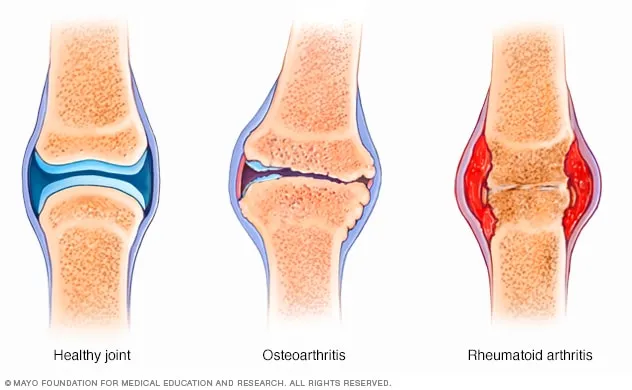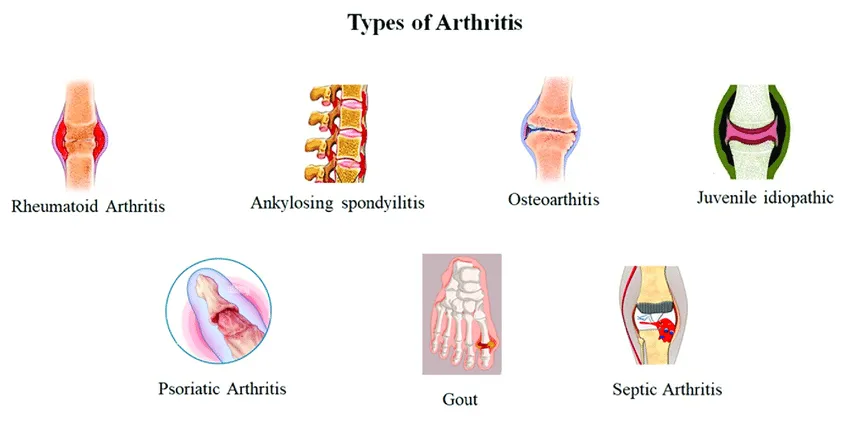Arthritis is often defined as the painful inflammation and stiffness of joints, but it encompasses much more. Rather than being a single condition, it’s an umbrella term that covers a wide range of joint diseases, each with its own causes and symptoms. Millions worldwide, including children and seniors, suffer from at least one form of arthritis. In the UK alone, about 10 million people are affected.
This guide covers the essentials of arthritis, including types, causes, symptoms, treatments, and lifestyle tips for managing the condition.
What is Arthritis?
Arthritis is a condition that affects the joints, where two bones meet, such as in the shoulders, knees, and fingers. The joints are cushioned by synovial fluid, cartilage, and ligaments, which allow smooth movement. When these protective mechanisms break down, inflammation, swelling, and pain occur.

Common Types of Arthritis
Arthritis is a broad term used to describe a range of conditions that cause pain and inflammation in the joints. It affects people of all ages but becomes more common as we age. The two most common types are osteoarthritis, which results from wear and tear on the joints, and rheumatoid arthritis, an autoimmune disease that targets the joints.
- Osteoarthritis: The most common form, osteoarthritis, results from wear and tear over time. It occurs when cartilage in the joints becomes rough, leading to pain and stiffness, particularly in weight-bearing joints like the knees, hips, and spine. Osteoarthritis typically affects people over 45, and maintaining a healthy weight and regular exercise can help manage symptoms.
- Rheumatoid Arthritis: This is an autoimmune disorder where the immune system mistakenly attacks healthy tissue, causing painful inflammation in the joints. Early treatment with disease-modifying antirheumatic drugs (DMARDs) is essential to prevent joint damage.
- Gout: Gout is an inflammatory arthritis that occurs when uric acid builds up in the body, forming crystals in the joints. It often affects the big toe but can also appear in other joints, causing severe pain and redness. A diet low in purines and alcohol can help prevent flare-ups.
- Psoriatic Arthritis: Linked to psoriasis, an autoimmune condition, psoriatic arthritis causes joint pain and swelling, as well as skin rashes. Treatment typically includes anti-inflammatory medications and biological therapies.
- Ankylosing Spondylitis: This type affects the spine, causing pain and stiffness, especially in young adults. Keeping active and maintaining good posture are crucial for managing symptoms.
- Juvenile Idiopathic Arthritis (JIA): Affecting children under 16, JIA is an autoimmune disease that causes joint pain and swelling. Early diagnosis and treatment help reduce long-term damage.

Recognizing Symptoms of Arthritis
Arthritis symptoms vary depending on the type, but common signs include:
- Joint pain and stiffness
- Swelling and tenderness
- Reduced range of motion
- Redness and warmth around the joint
If you experience persistent joint pain for several days, consult a doctor. Early diagnosis can help initiate treatment and improve quality of life.
Causes of Arthritis
Arthritis can have various causes, depending on the type:
- Inflammatory Arthritis: Conditions like rheumatoid arthritis and gout are triggered by immune system issues or uric acid buildup.
- Degenerative Arthritis: Osteoarthritis is primarily caused by the gradual wear and tear of cartilage, often worsened by aging, obesity, or joint injuries.
- Genetic Factors: Some forms of arthritis, like gout or rheumatoid arthritis, may run in families, increasing your risk of developing the condition.
- Environmental Factors: Exposure to certain environmental triggers, such as infections, may contribute to the development of autoimmune arthritis.
Managing Arthritis Symptoms
Living with arthritis can be challenging, but several strategies can help manage symptoms and improve quality of life:
- Stay Physically Active: Regular exercise strengthens muscles, reduces joint stiffness, and promotes flexibility. Low-impact exercises like swimming, cycling, yoga, and Pilates are ideal for people with arthritis.
- Maintain a Healthy Weight: Excess weight puts extra pressure on joints, especially the knees, hips, and spine. Losing weight can reduce pain and slow the progression of osteoarthritis.
- Use Pain Relief Treatments: Over-the-counter nonsteroidal anti-inflammatory drugs (NSAIDs), creams, and gels can help manage mild pain. For more severe symptoms, consult a doctor about prescription medications or therapies like Transcutaneous Electrical Nerve Stimulation (TENS).
- Consider Surgery: In severe cases where other treatments fail, joint replacement surgery (e.g., knee or hip) may be an option to restore mobility and reduce pain.

Does Knuckle Cracking Cause Arthritis?
Despite the widespread myth, cracking your knuckles does not cause arthritis. Research from the Arthritis Research Centre at John Hopkins University found no evidence linking knuckle cracking to arthritis. However, prolonged or excessive knuckle cracking may weaken ligaments around the joints, potentially affecting grip strength.
Foods That Help with Arthritis
Diet plays a key role in managing arthritis. Certain foods can help reduce inflammation and support joint health:
- Omega-3 Fatty Acids: Found in fatty fish like salmon and sardines, omega-3s are known for their anti-inflammatory properties. Supplements like fish oil or vegan alternatives can also help ease joint stiffness.
- Fruits and Vegetables: Colorful fruits like berries and citrus, as well as leafy greens like spinach and kale, are rich in antioxidants that help fight inflammation.
- Olive Oil: Extra virgin olive oil contains oleocanthal, a compound with anti-inflammatory effects similar to ibuprofen.
Foods to Avoid
Some foods may trigger or worsen arthritis symptoms:
- Nightshade Vegetables: While packed with nutrients, vegetables like tomatoes, potatoes, and bell peppers contain solanine, a compound that some people with arthritis find aggravates their pain.
- Processed Foods: High in sugar, salt, and unhealthy fats, processed foods can contribute to inflammation and weight gain, worsening arthritis symptoms.
Natural Supplements for Arthritis
Several natural supplements have been shown to help relieve arthritis symptoms:
- Curcumin (Turmeric): Known for its anti-inflammatory and antioxidant properties, curcumin, especially when combined with black pepper extract, can ease pain and stiffness.
- Glucosamine: This supplement supports cartilage health and may help relieve mild to moderate osteoarthritis pain.
- Boswellia: Derived from the resin of the Boswellia tree, this anti-inflammatory compound has been used for centuries to treat joint pain.
- Vitamin D3 and Calcium: Both are essential for bone health, especially for people with arthritis. Vitamin D helps the body absorb calcium, reducing the risk of osteoporosis.

In Conclusion
Arthritis can be a challenging condition, but with proper management, you can maintain an active and healthy lifestyle. Regular exercise, a nutritious diet, and timely medical care are essential for reducing symptoms and improving your quality of life. Whether you’re using traditional treatments or exploring natural supplements, understanding arthritis and its various forms is the first step to living well with the condition.
For more advice on managing arthritis or choosing natural supplements, feel free to contact us at . We’re here to help!





 No products in the cart.
No products in the cart.